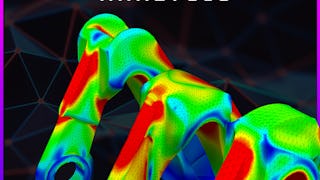Filter by
SubjectRequired
LanguageRequired
The language used throughout the course, in both instruction and assessments.
Learning ProductRequired
LevelRequired
DurationRequired
SkillsRequired
SubtitlesRequired
EducatorRequired
Explore the Statics Course Catalog
 Status: Free
Status: FreeThe Hong Kong University of Science and Technology
Skills you'll gain: Structural Analysis, Mechanics, Engineering Calculations, Mechanical Engineering, Civil Engineering, Engineering Analysis, Engineering Drawings, Geometry, Algebra, Applied Mathematics
 Status: Free
Status: FreeGeorgia Institute of Technology
Skills you'll gain: Engineering Analysis, Mechanics, Torque (Physics), Engineering Calculations, Mechanical Engineering, Engineering, Civil Engineering, Structural Analysis, Trigonometry

Korea Advanced Institute of Science and Technology(KAIST)
Skills you'll gain: Electrical Engineering, Basic Electrical Systems, Electronic Components, Electrical Systems, Differential Equations, Physics, Engineering Analysis, Integral Calculus, Applied Mathematics, Advanced Mathematics, Scientific Visualization, Engineering Calculations, Calculus, Electronic Systems, Mechanics, Electronics, Energy and Utilities, Mathematical Modeling, Linear Algebra
 Status: Free
Status: FreeGeorgia Institute of Technology
Skills you'll gain: Structural Analysis, Structural Engineering, Engineering Analysis, Mechanical Engineering, Mechanics, Engineering
 Status: Free
Status: FreeCoursera Project Network
Skills you'll gain: Finite Element Methods, Engineering Analysis, Simulation and Simulation Software, Engineering Calculations, Mathematical Modeling, Structural Analysis

Georgia Institute of Technology
Skills you'll gain: Structural Analysis, Probability & Statistics, Structural Engineering, Hydraulics, Statistical Methods, Statistics, Engineering Analysis, Mechanical Engineering, Probability, Engineering, Probability Distribution, Mechanics, Engineering Calculations, Civil Engineering, Applied Mathematics, Algebra, Advanced Mathematics, Calculus, Differential Equations, Geometry
What brings you to Coursera today?
 Status: Free
Status: FreeUniversity of Rochester
Skills you'll gain: Basic Electrical Systems, Music, Electrical Engineering, Electronics, Electronic Components, Electronics Engineering, Electrical Systems, Instrumental Music, Vibrations, Equipment Design, Construction, Mechanical Design
 Status: Free
Status: FreeGeorgia Institute of Technology
Skills you'll gain: Structural Analysis, Mechanical Engineering, Failure Analysis, Engineering Analysis, Mechanics, Engineering Calculations, Civil Engineering, Mathematical Modeling, Laboratory Testing, Engineering Design Process
 Status: Free
Status: FreeÉcole Polytechnique
Skills you'll gain: Vibrations, Engineering Analysis, Civil Engineering, Mechanical Engineering, Engineering, Mechanics, Chemical and Biomedical Engineering, Applied Mathematics, Mathematical Modeling, Differential Equations
 Status: Free
Status: FreeGeorgia Institute of Technology
Skills you'll gain: Mechanics, Mechanical Engineering, Engineering Analysis, Structural Engineering, Torque (Physics), Vibrations, Engineering, Physics, Civil Engineering, Calculus, Applied Mathematics, Mathematical Modeling

Rice University
Skills you'll gain: Basic Electrical Systems, Electrical Engineering, Torque (Physics), Physics, Electrical Systems, Engineering Analysis, Electronic Components, Mechanics, Electronic Systems, Mathematical Modeling, Applied Mathematics, Engineering Calculations, Calculus, Advanced Mathematics, Trigonometry, Linear Algebra

Rice University
Skills you'll gain: Mechanics, Torque (Physics), Physics, Structural Analysis, Mechanical Engineering, Engineering Calculations, Calculus, Engineering Analysis, Mathematical Modeling, Algebra, Physical Science, Applied Mathematics, Geometry, Trigonometry
In summary, here are 10 of our most popular statics courses
- Mastering Statics: The Hong Kong University of Science and Technology
- Introduction to Engineering Mechanics: Georgia Institute of Technology
- Electrodynamics: Korea Advanced Institute of Science and Technology(KAIST)
- Applications in Engineering Mechanics: Georgia Institute of Technology
- FEM - Linear, Nonlinear Analysis & Post-Processing: Coursera Project Network
- Fundamentals of Engineering Exam Review: Georgia Institute of Technology
- Fundamentals of Audio and Music Engineering: Part 1 Musical Sound & Electronics: University of Rochester
- Mechanics of Materials I: Fundamentals of Stress & Strain and Axial Loading: Georgia Institute of Technology
- Fundamentals of Fluid-Solid Interactions: École Polytechnique
- Engineering Systems in Motion: Dynamics of Particles and Bodies in 2D Motion: Georgia Institute of Technology










